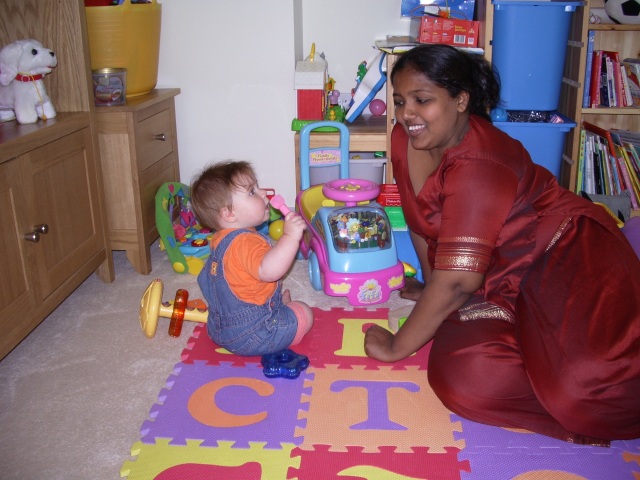Whenever I think about the many places I have lived over my years I am reminded of the domestic staff we had at the time: Enca the cook in Manila, Arricelli in Caracas, Anne Marie in Kingston, Ansa my saviour in Islamabad, and now here in Pretoria Sarna who keeps the house clean and me sane at the same time with her company and funny tales. They play such a huge part in our lives and yet so little is heard from them. All these people have stories of their own and when I get the chance I love to talk to them about their lives, their upbringing and also about things like their take on current politics. After all, what better a place to get a feel for the thoughts of the “man on the street” than from someone who is out there living it?
So I was delighted when I came across the story of two women right here in South Africa, German expat Nicole and her Zimbabwean helper Charity, who have collaborated to produce a book about Charity’s life. As far as I am aware this is a unique product but do let me know if you think otherwise. But in the meantime I leave it up to Charity and Nicole to tell their story and why they have produced this amazing book together:

It´s a common situation on the African continent and in many other places around the world: A family has a domestic helper, a nanny or a gardener, often staying with them under the same roof. For many years they might be living on the same grounds, spending the day together, but how much do they really know about each other’s lives? We are not aware of the path that this person went along before ending up in our household.
First of all, how did this project come about? Who came up with the idea and what was the inspiration for it?
Charity got to read all these books in the house, because we didn´t provide her with a TV. Many different stories, lots of them stories about women. Women on all continents in all situations. So suddenly one-day Charity comes up to me and asks/says if she shouldn´t write down her story. We had a short chat about it and I really liked the idea a lot. So I encouraged her. I got her a notebook and two pencils and then obviously she sat down and started it.
How did you work together – Charity, did you tell Nicole your story? How hard (or easy!) was it working together?
Charity: I sat down in my room many nights and weekends writing down my story into a notebook, handwritten. When this was finished, Nicole provided me with a laptop and showed me how to type and save. As I was only typing with one finger, it took forever. My daughter, who is attending IT school in Harare came over in her school break for two weeks and typed the whole rest that was left for me. We sat together many, many hours. It was tough times also, because she learnt so much more in detail about her mother´s life. Many tears rolling down our cheeks during that time. Only when everything was saved in a word document, Nicole got to read my story. During the time of writing I often asked her about her opinion on certain types of writing, which we discussed then.
Nicole: Only after Charity´s whole book was digitalized, I started reading and correcting it. We often sat together, when Charity had to explain to me what she wanted to say and how certain African traditions work… I often needed to ask about types of food that are described. It was a very interesting process. We worked very hard.
Here is a story, the story of Charity, of her life, that is really touching. It´s the story of a not so ordinary Zimbabwean woman. Charity was born in 1972 and although her childhood wasn´t very easy she succeeded in getting a decent job. Unfortunately she picked a difficult husband, she lost a child and soon life was turned upside down. But still Charity could afford a maid looking after her household and her two kids while she was working. One day she made one big wrong decision. She gave up her job to go out and dig for gold. That didn´t bring her any luck and life got worse. Trying to survive with her family she ended up risking her life in the diamond fields. Also without any success. She went through extreme times in Mozambique, trapped by her own family. Many times betrayed she finally ends up in South Africa. Now working as a maid herself.
How important do you think it is for this story to be heard – not just for Charity but for all the women like her out there?
It might be a typical story of many women out there that went through similar stages or situations in life. But I still think that Charity´s life was/is very interesting to tell, because she went through so many different types of struggle, in different countries, that she managed to get through and always got out of it somehow. Always and forever having her two kids in mind and mostly wondering about their wellbeing.
What can we (as expat employers of domestic staff around the world) learn from Charity’s story? What would you like us to take away from it?
The story/book will give an expatriate an inside/background on what a woman in their household might have gone through before ending up in their house. I can only speak for Charity, but it seems to me that she just works to get a good education for her kids, that´s the most important for her. Because she knows she doesn´t have a retirement fund or similar. Her kids are her guarantee for later. If they will not be able to feed their own families and Charity, she will have a problem. She knows that she needs to finish her house in Zimbabwe and pay for their education. All she wishes for is that they will have a better, easier future/life than she had. And sure, that they will be able to look after her, when she is too old to earn her own money one day.
Charity – what would you like to see for your own future, and that of your children and grandchildren?
Charity: I want to have a better life. If I manage to finish my house I know I would have the possibility to rent out a room and earn some monthly income to get me food, even if my children wouldn´t be around, when I am older and back in my home country. Kids should have a good education and I hope that my ones can finish their courses one day and get a chance for a decent job.
I am very proud of my kids. They are always studying. Although I can only barely afford to send one of them to school at the moment, they still sit together in the afternoon at home and share their knowledge. My daughter, who is one year older, is still going to IT school and doing very well. I hope that I will be able to pay for her school fees in the future. I managed to pay for a driver licence for my son, but at the moment he is the one staying at home and studying the books for a ACCA course. Maybe I can pay for his exam fees also one day.
So a better and more stable future for the three of us, that´s what I am hoping for.
I understand Nicole is leaving soon (to go to Germany?) – will you stay in touch?
We sure will stay in touch. We have this important project going on together which is long not finished. There is still a long way to go and we will go it together. I am still looking for a publisher for the printed book for Charity.
My plan is also to translate the book in German for her. And maybe I can find a publisher for her in a Germany then.
To find out more about the book and to buy a copy please click here.



